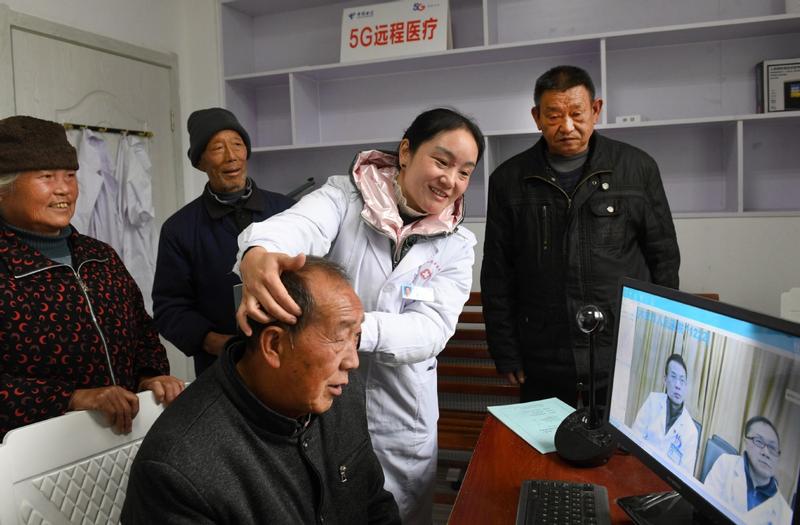 In this undated file photo, a village doctor (second from right) helps a patient take part in a virtual consultation in Jinzhai county, Anhui province. (PHOTO / XINHUA)
In this undated file photo, a village doctor (second from right) helps a patient take part in a virtual consultation in Jinzhai county, Anhui province. (PHOTO / XINHUA)
Chinese e-commerce platforms that have ventured into the healthcare sector should have long-term business strategies and governmental supervision needs to be enhanced to ensure the sustainable development of the sector, industry experts said.
Short-video platform Kuaishou subsidiary kwaixiaodian.com recently expanded its business scope, adding "healthcare consultation, and sales of Class I and II medical devices" into service portfolio, said company registry platform Qichacha.
Kuaishou can now legally offer healthcare consultation and sell medical devices except for Class III products-medical devices that are implanted into the human body, or are used to support life, and pose a potential danger to the human body.
"Kuaishou first stepped into the healthcare sector in 2019. Offering popular medical science short videos, online health consultations and medical device sales, the company has already established relatively clear thoughts about healthcare, and has been gradually testing the waters," said Hu Xuan, an analyst at VCBeat, an online healthcare website.
Yet Chinese internet tycoons trying their hand at healthcare are nothing new. Just this year alone, Baidu Inc launched Qingzhu Health, a mobile app designed for doctors to facilitate intelligent chronic disease management, while ByteDance began to recruit bio-informatics engineers as it plans to enter the high-throughput sequencing field.
ALSO READ: Online healthcare needs more govt support
Also this year, Alibaba's AliHealth invested in Beijing-based medical big data platform LinkDoc, in an effort to jointly build a full-disease cycle service platform for cancer patients. JD Health launched an online rare disease care platform to raise accessibility of key drugs nationwide.
To this end, China's e-commerce platforms are adding healthcare-related products and services into their portfolios and refining operational capabilities to create more business opportunities.
Hu Xuan, analyst at VCBeat, an online healthcare website
According to a report released by mobile internet big data company QuestMobile, in 2020, internet user growth numbers in China were relatively stagnant. Total monthly active users in the country in April 2020 only rose 1.8 percent from the same period in 2019, and a ceiling for total short video users began to appear.
"In the future, competition among internet platforms will shift from competition for the incremental market to more intense inventory competition," said the report.
"To this end, China's e-commerce platforms are adding healthcare-related products and services into their portfolios and refining operational capabilities to create more business opportunities," Hu said.
"Kuaishou can now sell Class I and II medical devices on its platform, but strict follow-up oversight from the government is required, bringing challenges to the company."
It is not easy for short video platforms to build up trust among users, which is especially important in the healthcare business. Only when the problem of trust is solved can short videos become an important channel to sell medical products and services, he added.
Yet, the sector is still alluring.
Chen Dongsheng, founder of Fortune Global 500 company Taikang Insurance Group, said at a forum in 2019, "A decade from now, the healthcare industry is expected to surpass the real estate and automobile sectors to become the largest in China."
Hu of VCBeat added: "For internet companies, it is understandable to seek new growth points. However, healthcare is a 'slow profit-making' industry, as it is related to people's lives and is greatly affected by governmental supervisions and policies. Even for e-commerce behemoths, there is still a long way to go."
Wang Hang, founder and CEO of online healthcare platform haodf.com, said the internet-based healthcare sector is a newly emerging sector, and its development pace is ahead of the introduction of related regulatory policies.
"A stricter supervision system from the government is required, and the industry's self-discipline is of equal importance," Wang said.
Wei Wei, a professor at the Alibaba Cloud Academy, suggested that for enterprises that throw their hats into the healthcare sector ring, they should have a balanced portfolio encompassing both short-term profitable products and long-term products in order to maintain cash flow and have a broader vision.
READ MORE: Virtual medical care services benefit from policies
"Companies should abide by the government's supervision. In this way, the industry can achieve positive, healthy and sustainable development," he said.


